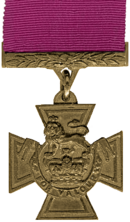Harold Auten facts for kids
Quick facts for kids
Harold Auten
|
|
|---|---|
 |
|
| Born | 22 August 1891 Leatherhead, Surrey |
| Died | 3 October 1964 (aged 73) Bushkill, Pennsylvania |
| Buried |
Sandhill Cemetery, Bushkill
|
| Allegiance | |
| Service/ |
|
| Years of service | 1910–1945 |
| Rank | Commander |
| Battles/wars | First World War
|
| Awards | Victoria Cross Distinguished Service Cross Decoration for Officers of the Royal Naval Reserve Legion of Merit (United States) Order of Orange-Nassau (Netherlands) |
| Other work | Movie executive |
Harold Auten (born August 22, 1891 – died October 3, 1964) was a brave officer in the Royal Naval Reserve (RNR). He earned the Victoria Cross, which is the highest award for bravery in the British military. He received this special medal for his actions during the First World War.
Before the war, Auten joined the RNR. He served on special ships called Q-ships during the First World War. These ships looked like regular merchant ships but secretly carried hidden weapons. In 1917, he was promoted to Lieutenant. He also received the Distinguished Service Cross for his patrol and escort duties.
Life After the Wars
After the First World War, Harold Auten wrote a book. It was called Q Boat Adventures and came out in 1919. It was the first book ever written about Q-ships.
Working in Movies and Hotels
Later, Harold Auten moved to New York. He became an important executive for the Rank Organisation, a big movie company. He lived for 30 years in Bushkill, Pennsylvania. There, he owned both a hotel and a cinema.
Serving in World War II
Even though he was working in movies, Harold Auten stayed in the RNR. In 1941, he received another award. It was called the Royal Naval Reserve Officers Decoration.
During World War II, he was a Commander in the RNR. He helped organize important convoys across the Atlantic Ocean. These convoys were groups of ships traveling together. They protected supplies from enemy attacks.
For his great service, he received two more awards. The United States gave him the Legion of Merit. The Netherlands gave him the Order of Orange-Nassau. Both awards recognized his help for the Allied forces during the war.
 | DeHart Hubbard |
 | Wilma Rudolph |
 | Jesse Owens |
 | Jackie Joyner-Kersee |
 | Major Taylor |

